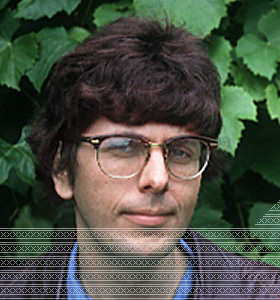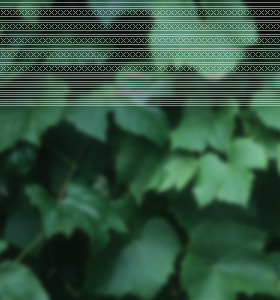Wednesday, February 18, 2026 |
||

THE UNWOUND SOUND // Ten years on, the Olympia, Wash.-based punk rockers have delivered an epic album that finds them... well, artier than ever. |
|
| Interview Jenny Tatone Photography Jim McGinnis | |

David Scott Stone 
"I'm definitely influenced by soundtracks. I was thinking a lot about movies when we were making Leaves Turn Inside You — trying to get that epic scope into it." — Justin Trosper |
Tatone: I was reading in your bio about Unwound taking more risks to experiment more than ever before, and how that had a lot to do with an overall increase in confidence among the band. Is there something that made you feel that way?
Trosper: We've been playing together for so long, getting older. I feel a lot more confident realizing how to focus. [Whereas before] I was focused on a whole different level, but not confident — a certain amount of confidence with a little arrogance [laughing]. Initially, it was learning how to play music — it's still that way. I still feel the need to practice. I've gone through a super lazy period: "Oh, I'm fine, just strum. I know a couple chords." Now I'm in a space where I actually want to increase my actual physical playing ability; being able to feel at ease when I'm playing in front of people and being able to translate music — having the songwriting translate better. Tatone: That kind of goes along with the whole evolution too, just slowly progressing into having it become second nature. Trosper: Yeah. The better you get at an instrument, or learning how to write songs, [it] really makes a huge difference. I think our earlier stuff was based on energy and song structure — we had this energy level that was more about trying to create natural dynamics. Tatone: Then are you eager to play live? Trosper: Yeah, we're adding a second guitar player [David Scott Stone] for the next tour, so we're all eager to see that. Tatone: Is it frustrating that Kill Rock Stars doesn't have the wherewithal to make the world aware of Leaves Turn Inside You? It seems that millions of rock fans would love the album if they just knew about it. Trosper: I dunno, can't blame it all on the label. A lot of it has to do with timing and luck. A lot of people have heard our name but have never heard our music. People that are into music are like, "Oh yeah, I've heard that name before. I've heard this is what they do." In one way that works against us. I think there's probably a whole generation of people born in the '80s that might like it. Our whole thing from the beginning was that we're not gonna try to rely on getting in magazines, hyping ourselves. We're just gonna bring ourselves around live. I think the albums could probably be distributed better. But it's really just luck. I mean, Sleater-Kinney is on the same label and they're huge. It has something to do with the accessibility of the music; timing where you're at. We're at a good level that a lot of bands aren't ever gonna achieve — for better or worse, really. [You] can get so much recognition that it works against you, and [on the other hand] some people really feed off that kind of fame, that energy. Tatone: What do you think makes a band last, as opposed to being a flash in the pan? Like, you can be big for just a second, or you can be big forever. Do you think certain qualities determine that? Trosper: Yeah, the basis of any band that keeps it together is like, "We're not gonna worry so much about having a lot of attention." We decided early on that if we play in basements all the time, that's fine and [we'll] see where it goes from there. That's how we did it; going on tours until we built interest slowly, semi-professionally. Keeping a strong basis musically first and not worry about the other stuff too much. It goes with the times too. When Repetition came out [in 1996], that was probably the biggest year. Tons of people were always going to shows, which was sort of that culmination of the early '90s peak [in Northwest music]. And then a lot of people moved off, out of music. Now it's at a point where a lot of people are experimenting with different genres of music. It's come back full circle. It's starting to feel a little more like it did in the early '90s, except not as overblown. Tatone: Over the years it seems what it means to be independent has gone from simply working independently as an artist [free from contract restrictions] to classifying an entire sound, look and style. Ironically, it's become a mentality to capitalize on. How have these sorts of changes affected you, if at all, and what does it mean to you to be independent now? Trosper: Being independent goes beyond major label vs. indie labels. That's been the wrong focus for too long. I don't think, politically, it matters. But a lot of people that are in bands use the, "Yeah we're independent until something better comes along." And they're not thinking in terms of making their art. They're thinking in terms of success. I think there's people that have gone to a major label and were not thinking in terms of success and it's worked out fine for them; they still remain independent as an artist in their head. It's more like a lifestyle: You don't wait for things to happen to you, you just do it yourself until someone else can help you do it better than you can, and use your abilities to the best you can. And, of course, go to the commune and buy organic [laughing]. I think, for a lot of people, what you buy defines you; where-you-spend-your-money type of thing. It's consumer culture. People feel better about themselves if they buy organic orange juice instead of Minute Maid — that pacifies people. They don't have to be actively political, just have to buy the right products: "I buy organic. I buy independent labels. I'm consuming the right things." That's the argument behind people saying, "Well, we're consuming the right things. We're supporting the right businesses." I'm actually a person who tries to consume the right things. When you get down to making art, it really goes beyond that. That's not really part of the creative process. That's part of consumerism. It doesn't really matter who's behind what you're doing because there's all sorts of hypocrisies — that's part of life. A lot of people get to that level and they can't handle it, and it ruins their band because they don't have a strong basis. Even pretty good bands, when they switched over to majors, they got all this money and disputed over so many different things. Signing to a major label is sort of a test for certain people: "Are they really a good band or not? Is money going to ruin this band?" It will if they don't have a strong basis for the band. So they shouldn't have signed to a major. They should've practiced more or gotten their egos taken care of first. We're all artists, and we're all egocentric, and there's constant chaos with other artists. Focus your egocentrism into collaborating with others. The beauty of it is when that happens, people are letting the music happen. |